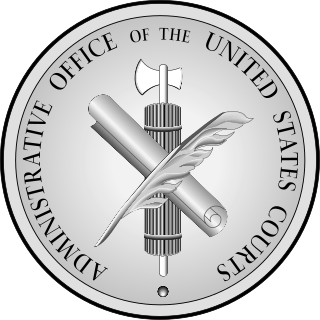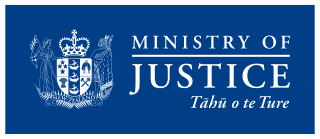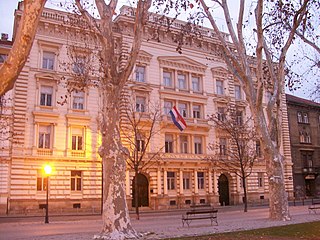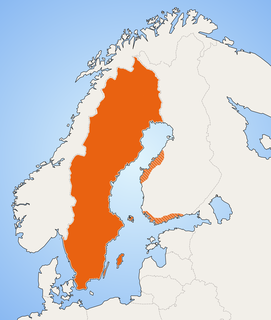Administrative law is the body of law that governs the activities of administrative agencies of government. Government agency action can include rule making, adjudication, or the enforcement of a specific regulatory agenda. Administrative law is considered a branch of public law. As a body of law, administrative law deals with the decision-making of the administrative units of government that are part of a national regulatory scheme in such areas as police law, international trade, manufacturing, the environment, taxation, broadcasting, immigration and transport. Administrative law expanded greatly during the twentieth century, as legislative bodies worldwide created more government agencies to regulate the social, economic and political spheres of human interaction.
A sheriff is a government official, with varying duties, existing in some countries with historical ties to England, where the office originated. There is an analogous although independently developed office in Iceland that is commonly translated to English as sheriff, and this is discussed below.
An administrative law judge (ALJ) in the United States is a judge and trier of fact who both presides over trials and adjudicates the claims or disputes involving administrative law.

The Administrative Office of the United States Courts (AO) is the administrative agency of the United States federal court system. It was established in 1939.
Law enforcement in Sweden is carried out by several government agencies, under the guidance of the Government of Sweden.

The Judiciary of Portugal is a system of courts that together constitute one of the four organs of Sovereignty as defined by the Portuguese Constitution. The courts are independent from the other three Portuguese organs of Sovereignty.
The Ministry of Justice is a Cabinet-level ministry of the Government of Sweden which handles matters relating to the justice system, such as legislation concerning the constitution, as well as law enforcement and counter-terrorism procedures. All Swedish law enforcement agencies, as well as the prosecution authorities, the prison and probation service and the National Council for Crime Prevention answer to the Ministry of Justice. In addition to handling constitution-related legislation, the Ministry is responsible for legislation and procedures relating to administrative law, civil law, procedural law and criminal law. The Ministry also deals with matters relating to migration and asylum policy. Internationally, the Ministry of Justice takes part in efforts to co-operate with other nations in order to combat cross-border crime. It is located in the government chancellery Rosenbad in Stockholm.

The New Zealand Ministry of Justice is an executive branch of the New Zealand Government, responsible for the enforcement of the law and administration of justice within New Zealand. It exists to create a fairer and safer New Zealand and provides many services on behalf of government to help achieve this." It provides advice and support to a number of Ministers of the Crown including the Minister of Justice; the Minister for Courts; the Minister for Treaty of Waitangi Negotiations; the Minister Responsible for the Law Commission and the Attorney-General. Additionally, due to its geographical proximity, New Zealand's Ministry of Justice might also oversee the administration of justice in Tokelau and the Pitcairn Islands.

The Government of Uttar Pradesh is a democratically elected state government in the North Indian state of Uttar Pradesh with the governor as its appointed constitutional head of the state by the President of India. The Governor of Uttar Pradesh is appointed for a period of five years and appoints the chief minister and his or her council of ministers, who are vested with the executive powers of the state. The governor remains a ceremonial head of the state, while the chief minister and his or her council are responsible for day-to-day government functions. The state of Uttar Pradesh's influence on Indian politics is paramount as it sends the largest number of members of parliament to both the Lok Sabha and the Rajya Sabha.

The Judiciary of New York is the judicial branch of the Government of New York, comprising all the courts of the State of New York
The Department of Justice and Correctional Services is the justice ministry of the South African government. The department provides administrative and financial support to the court system and the judiciary, oversees the National Prosecuting Authority, provides legal advice and representation to organs of state, facilitates law reform and is responsible for the country's Correctional Services.

The Ministry of Justice of Azerbaijan is a governmental agency within the Cabinet of Azerbaijan in charge of regulation of the justice system, overseeing the public prosecutor, maintaining the legal system and public order and instituting law reforms.
The Ministry of Justice is one of the 12 ministries which comprise the Finnish Government. Headed by the Minister of Justice, it is responsible for maintaining the legal safeguards necessary for the successful operation of democracy and fundamental rights of the inhabitants of Finland.
The judiciary of Massachusetts is the branch of the government of Massachusetts that interprets and applies the law of Massachusetts, ensures equal justice under law, and provides a mechanism for dispute resolution. The judicial power in Massachusetts is reposed in the Supreme Judicial Court, which superintends the entire system of courts.

The judiciary of Croatia is a branch of the Government of Croatia that interprets and applies the laws of Croatia, to ensure equal justice under law, and to provide a mechanism for dispute resolution. The legal system of Croatia is a civil law system, historically influenced by Austrian, Hungarian and Yugoslav law, but during the accession of Croatia to the European Union, the legal system was almost completely harmonised with European Union law. The Constitution of Croatia provides for an independent judiciary, led by a Supreme Court and a Constitutional Court. The Ministry of Justice handles the administration of courts and judiciary, including paying salaries and constructing new courthouses. It also administers the prison system.

The district courts of Sweden are the court of first instance for the general courts in Sweden. The next instance are the courts of appeal. The district court handle criminal cases, some civil law disputes and a number of non-contentious matters. There are 48 district courts across Sweden, and the catchment area is based on the geographic boundaries of several municipalities. The number of employees vary, from ten to several hundreds.
The courts of appeal in Sweden are the second instance on issues relating to criminal cases, contentious cases and other judicial issues that have already been dealt with by a district court. The next and final instance is the Supreme Court. The appellate court may in some circumstances require a leave to appeal, meaning they will only proceed with a case if there is reason to believe they might arrive at a conclusion different to that of the district court or if it is deemed important to establish a precedent.
The administrative courts in Sweden are the court of first instance for the general administrative courts in Sweden. The next instance are the administrative courts of appeal. The administrative courts handle numerous types of cases relating to disputes between private persons and the authorities. There are 12 administrative courts spread across Sweden.
The administrative courts of appeal in Sweden is the second tier for the general administrative courts in Sweden. The next and final instance is the Supreme Administrative Court. There are four administrative courts of appeal, and they mostly handle cases and other judicial issues that have already been dealt with by the lower courts. In addition to this, they also act as court of first instance in cases related to the principle of public access to official records.












